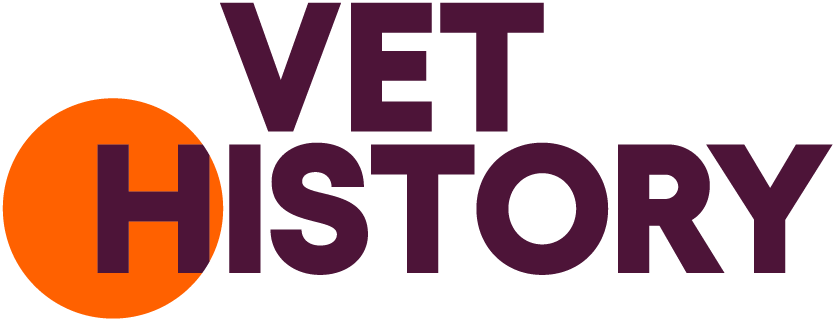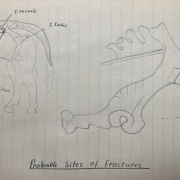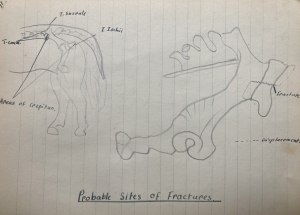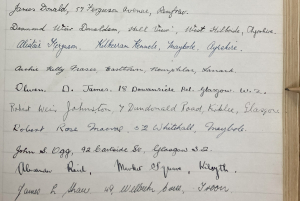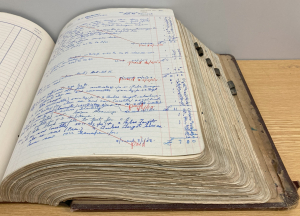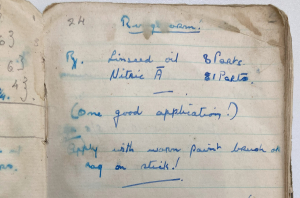Archival Arrivals
At the RCVS Archives we are always on the lookout for interesting documents to add to our collections. Recently we acquired two small but appealing archives, given to us by RCVS members.
In February an MRCVS from Cardiff contacted us offering to donate an item he first discovered when he purchased his practice in 1983. It’s a casebook compiled by Olwen James (1914-1974) between 1936 and 1939 during her time as a student at the Glasgow Veterinary College. Olwen graduated in July 1939, and appears on our list as the 113th woman to qualify as a veterinary surgeon since Aleen Cust became the first recognised female veterinary surgeon in December 1922. Olwen was also the eighth woman to qualify from Glasgow.
Olwen used her casebook to record each of the animals she treated during her course, which totalled 114 cases. For each animal she noted details of the patient (breed, gender, approximate age), her examination of its ailments, plus her diagnosis and subsequent treatment. Occasionally Olwen draws an illustration of the problem or plots a graph monitoring the patient’s condition. Ailments range from lymphangitis in a bay gelding to streptococcus mastitis in a Guernsey cow, plus she successfully performs an ovariotomy on a young cat, operates on a spaniel with a melanoma and castrates a Hereford bull. Her casebook is therefore an interesting window into the work students undertook and the recommended treatments at this time.
After graduation Olwen spent most of her working life in Cardiff. She established her practice in the Gabalfa area of the city, where she worked for over thirty years. Olwen was not the first female veterinary surgeon in the Cardiff area. Mary Farman graduated from London in December 1936 (number 77 on the list of female graduates) and joined a practice set up by Leonard Watson in the nearby town of Rumney. Olwen’s casebook joins our collection as document reference OJ/1.
Our next acquisition concerns Christopher Jolley (1919-1976) who graduated from Trinity College Dublin in July 1945. He initially practiced from his parents’ home in Glenealy, Co. Wicklow, before moving to the Bollarney South area of Wicklow town where he practiced between 1947 and 1958. He later worked for the Northern Ireland Ministry of Agriculture and finished his career in Inverness. His archive was kindly donated to us by his son, himself an MRCVS.
Christopher’s archive dates from his time in Wicklow town. It includes a small handwritten notebook containing recipes for a range of treatments such as foot rot in cattle, hysteria in dogs and what to give a young calf with a cough. There’s also a recipe for a treatment for ringworm using linseed oil which apparently worked best when applied with a warm paint brush or a rag on a stick.
The rest of Christopher’s archive consists of three large ledgers, detailing the accounts of individual clients around Co. Wicklow. A large portion of these were farmers, and Christopher was often required to make around twenty calls each day. According to his son, Christopher needed to replace his car around every six months, such was the high milage involved driving to and from clients along country roads. It’s believed these account books were maintained by Christopher’s wife, Dr Jean Hayes Jolley, herself a graduate of Trinity College Dublin. Each ledger entry gives us the client’s name and address plus details of treatments carried out over the years, including their cost. Christopher’s notebook is document reference CJ/1 and the three ledgers are references CJ/2 to CJ/4.
Both Christopher’s archive and Olwen’s casebook add to our understanding of domestic and agricultural veterinary treatment in the mid C.20th. We’d like to acquire more records of veterinary surgeons and veterinary nurses from previous generations, to preserve the evidence of past practices. Documents such as client ledgers, work diaries and recipe books will help us build a picture of the evolution of veterinary practice.
If you have any documents you’re willing to donate to the RCVS archive please contact us at archives@rcvsknowledge.org.
